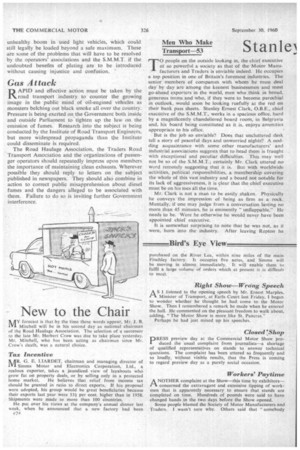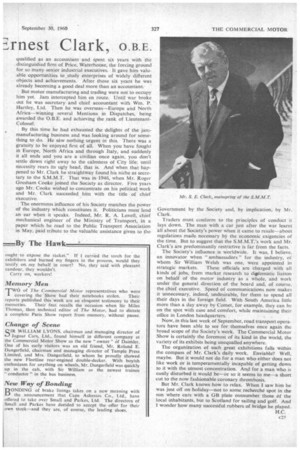Men Who Make Transport-53
Page 60

Page 61

If you've noticed an error in this article please click here to report it so we can fix it.
Stanle,
Ernest Clark, O.B.E.
TO people on the outside looking in, the chief executive of so powerful a society as that of the Motor Manufacturers and Traders is enviable indeed, He occupies a top position in one of Britain's foremost industries. The senior members of companies with whom he must deal day by day are among the keenest businessmen and most go-ahead exporters in the world, men who .think in broad, generous terms_and who, if they were to become parochial in outlook, would soon be looking ruefully at the red on their bank pass sheets. Stanley Ernest Clark, 0.B.E., chief exectnive of the S.M.M.T., works in a spacious office, hard by a magnificently chandeliered board room, in Belgravia and, his board being constituted as it is, enjoys amenities appropriate to his office. But is the job so enviable? Does that uncluttered desk tell a story of peaceful days and unworried nights? A nodding acquaintance with some other manufacturers' and industrial associations suggests that to head them is fraught with exceptional and peculiar difficulties. This may well not be so of the S.M.M.T.; certainty Mr. Clark uttered no word remotely suggesting that it is. But with worldwide activities, political responsibilities, a membership covering the whole of this vast industry and a board not notable for its lack of aggressiveness, it is clear that the chief executive must be on his toes all the time. Mr. Clark is not a man to be easily shaken. Physically he conveys the impression of being as firm as a rock. Mentally, if one may judge from a conversation lasting no more than 45 minutes, he is eminently " unflappable." He needs to be. " Were he otherwise he would never have been appointed chief executive.
It is somewhat surprising to note that he was not, as it were, born into the industry. After leaving Repton he qualified as an accountant and spent six years with the distinguished firm of Price, Waterhouse, the forcing ground for so many senior industrial executives. It gave him valuable opportunities to study enterprises of widely different objects and achievements. After those six years he was already becoming a good deal more than an accountant.
But motor manufacturing and trading were not to occupy him yet. Jam intercepted him en route. Until war broke out he was secretary and chief accountant with Wm. P. Hartley, Ltd. Then he was overseas—Europe and North Africa—winning several Mentions in Dispatches, being awarded the 0.-BE. and achieving the rank of LieutenantColonel.
By this time he had exhausted the delights of the jammanufacturing business and was looking around for something to do. He saw nothing urgent in this. There was a gratuity to be enjoyed first of all. When you have fought in Europe, North Africa and through Italy, and suddenly it all ends and you are a civilian once again, you don't settle down right away to the calmness of City life: until necessity rears its ugly head, that is. And when that happened to Mr. Clark he straightway found his niche as secretary to the S.M.M.T. That was in 1946, when Mr. Roger Gresham Cooke joined the Society as director. Five years ago Mr. Cooke wished to concentrate on his political work and Mr. Clark succeeded him with the title of chief executive.
The enormous influence of his Society matches the power of the industry which constitutes it. Politicians must lend an ear when it speaks. Indeed, Mr. R. A. Lovell, chief mechanical engineer of the Ministry of Transport, in a paper which he read to the Public Transport Association in May, paid tribute to the valuable assistance given to the
Government by the Society and, by implication, by Mr. Clark.
Traders must conform to the principles of conduct it lays down. The man with a car just after the war learnt all about the Society's power when it came to resale—about regulations made necessary by the economic exigencies of the time. But to suggest that the S.M.M.T.'s work and Mr. Clark's are predominantly restrictive is far from the facts.
The Society's influence is worldwide. It was, I believe, an innovator when " ambassadors " for the industry, of whom Sir William Welsh was one, were appointed in strategic markets. These officials are charged with all kinds of jobs, from market research to diplomatic liaison on behalf of the motor industry as a whole, and work under the general direction of the board and, of course. the chief executive. Speed of communications now makes it unnecessary, indeed, undesirable, for them to spend all _ their days in the foreign field. With South America little more than a day away by Comet, for example, they can be on the spot with ease and comfort, while maintaining their office in London headquarters.
Now, in this last week of September, road transport operators have been able to see for themselves once again the broad scope of the Society's work. The Commercial Motor Show is certainly the foremost of its kind in the world, the variety of its exhibits being unequalled anywhere.
The organization of such great exhibitions falls within the compass of Mr. Clark's daily work. Enviable? Well, maybe. But it would not do for a man who either does not like work or is temperamentally incapable of getting down to it with the utmost concentration. And for a man who is easily disturbed it would be—or so it seems to me—a short cut to the now fashionable coronary thrombosis.
But Mr. Clark knows how to relax. When I saw him he was just off on holiday—not to some recherché spot in the sun where cars with a GB plate outnumber those of the local inhabitants, but to Scotland for sailing and golf. And I wonder how many successful rubbers of bridge he played.
























































































































































































